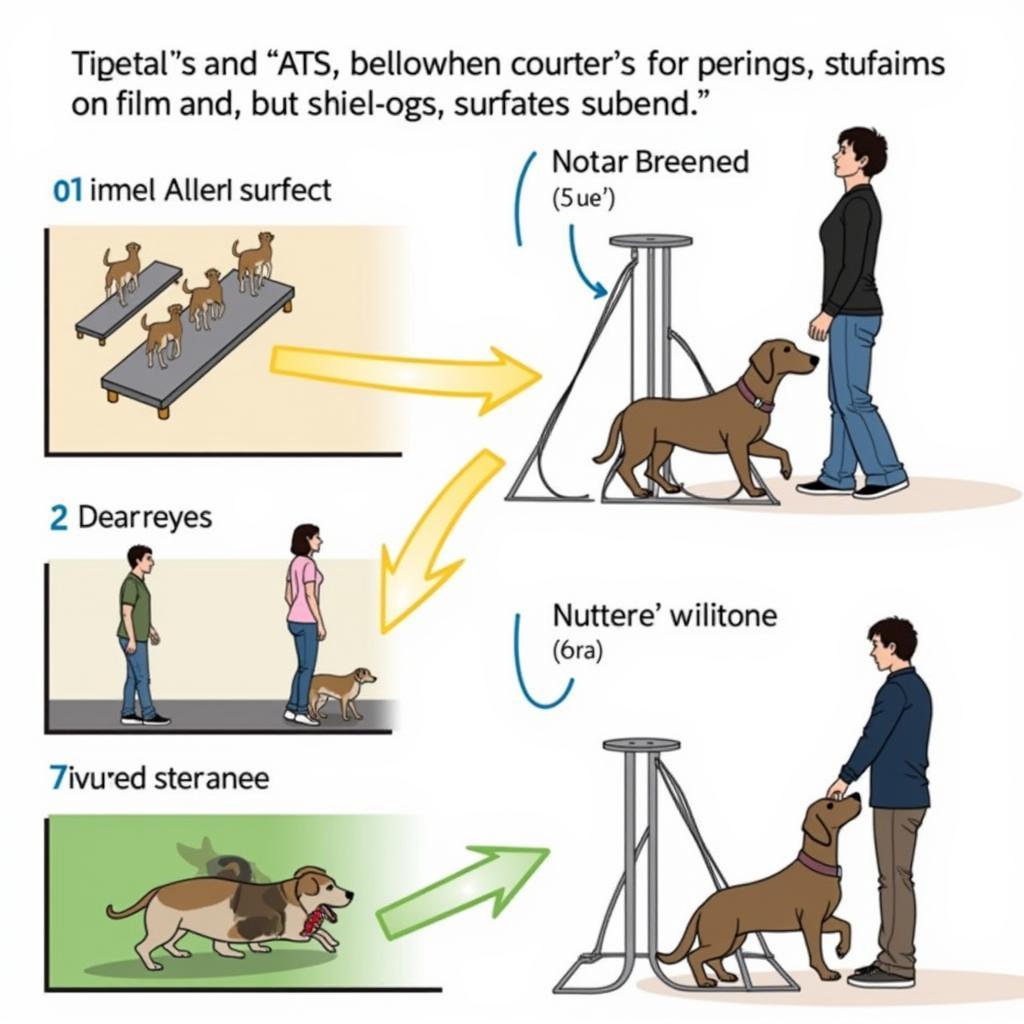The American Temperament Test Society (ATTS) evaluates the temperament of various dog breeds, including pitbull-type dogs. This test assesses a dog’s stability, shyness, aggressiveness, and friendliness towards humans and other dogs. But what does this mean for pitbulls specifically, and how does it contribute to a greater understanding of this often-misunderstood breed?
The American Temperament Test Society: Evaluating Canine Behavior
The ATTS temperament test is a standardized assessment designed to gauge a dog’s behavioral tendencies in various simulated situations. These scenarios are crafted to elicit a dog’s natural reactions to stimuli they might encounter in everyday life, such as encountering strangers, encountering unfamiliar objects, or navigating unexpected noises.
 American Temperament Test Society scenario
American Temperament Test Society scenario
Pitbulls and the ATTS: Dispelling Myths with Data
Pitbulls, despite often being perceived negatively, consistently achieve impressive pass rates on the ATTS. In fact, their performance often surpasses that of several other popular breeds. According to ATTS statistics, pitbulls demonstrate an average pass rate of 86.8%, exceeding the average for all breeds tested. This data directly challenges the common misconception that pitbulls are inherently aggressive or dangerous.
 Pitbull successfully completing the ATTS
Pitbull successfully completing the ATTS
“Temperament testing is crucial for responsible dog ownership,” explains Dr. Sarah Campbell, a certified canine behaviorist. “It provides valuable insights into a dog’s inherent behavioral tendencies, allowing owners to tailor training and socialization efforts effectively.”
Beyond Breed Specifics: The Importance of Individual Evaluation
While breed statistics provide a helpful benchmark, it’s vital to remember that every dog is an individual. Just like humans, dogs possess unique personalities and temperaments, influenced by a combination of genetics, upbringing, and environment. A dog’s breed provides a glimpse into its potential behavioral tendencies, but it doesn’t dictate its character.
Promoting Responsible Ownership and Challenging Stereotypes
Understanding the role of temperament testing is crucial for promoting responsible dog ownership. By recognizing that behavior stems from a complex interplay of factors rather than breed stereotypes, we can create a safer and more compassionate environment for all dogs, regardless of their breed. The ATTS data serves as a powerful tool to challenge misconceptions surrounding pitbulls, advocating for a fact-based understanding of this often-misjudged breed.
 A happy pitbull with its family
A happy pitbull with its family
FAQs
What does the ATTS temperament test involve?
The ATTS test assesses a dog’s reactions to various simulated scenarios, including encounters with strangers, unfamiliar objects, and unexpected noises.
How do pitbulls typically perform on the ATTS?
Pitbulls consistently achieve high pass rates on the ATTS, exceeding the average for all breeds tested.
Is breed the sole determinant of a dog’s temperament?
No, a dog’s temperament is influenced by a combination of genetics, upbringing, and environment.
Why is understanding temperament testing important?
Temperament testing promotes responsible dog ownership by providing insights into a dog’s behavioral tendencies, allowing owners to tailor training and socialization efforts effectively.
Does a high ATTS pass rate guarantee a dog will never display aggression?
While a good indicator of temperament, it’s crucial to remember that all dogs are individuals and can exhibit unpredictable behaviors under certain circumstances.
Need further assistance? Our team at the Society For Peace is here to help. Contact us at 02043854663, email [email protected], or visit our office located at Khu 34, Bắc Giang, 260000, Việt Nam. We offer 24/7 support and a wealth of resources to promote peace and understanding within our communities and beyond.